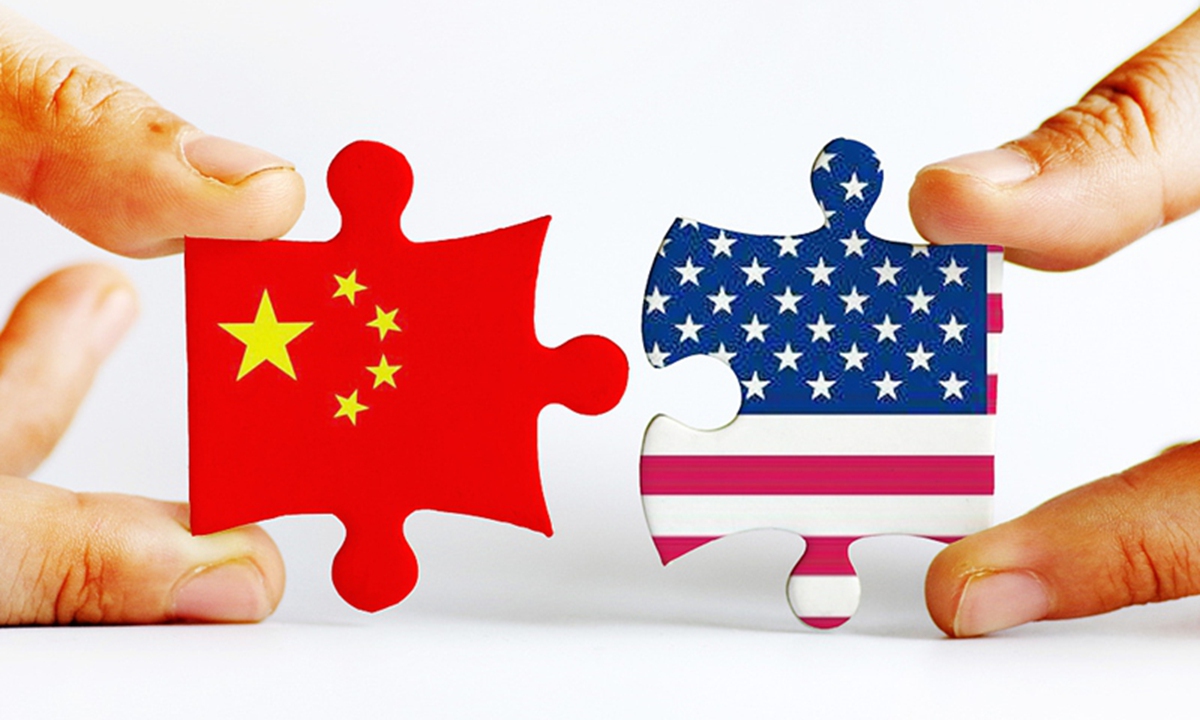
China US Photo:VCG
Editor's Note:
China and the US enacted tariff adjustments on May 14 following the implementation of the Joint Statement on China-US Economic and Trade Meeting in Geneva. The two sides have also agreed to establish an economic and trade consultation mechanism. As Beijing and Washington take steps to ease tensions, a more fundamental question arises: Why does the US quest for "Make America Great Again" necessitate cooperation with China? The Global Times has invited American scholars to explore this issue, discussing new possible pathways for the US to chart a course that boosts its own interests while scouting opportunities for mutually beneficial development with China. This is the twelfth piece of the "Wisdom on China&US" series.
In an age where Western political practices have tended to emphasize various forms of competition, zero-sum games and me-first-you-last exceptionalism - among other forms of conflict, if not extremism - it's important to recall that both Western and Chinese philosophical and political traditions offer many powerful arguments and examples illustrating the virtues and benefits of cooperation. Such similar traditions deserve closer attention as the US and China try to find a way forward in bilateral relations, especially given the potential for improvements signaled by their recent meetings in Geneva.
Among the Ancient Greeks, Plato wrote that a just and harmonious society is one built on the principles of cooperation, where individuals contribute to the common good based on their unique abilities. Aristotle believed, above all, that we are inherently social beings and need cooperation. He argued that we must pursue a shared future, which requires actively participating in a community and striving for a common good in lieu of simply pursuing individual desires.
Later, influential Enlightenment philosophers like John Locke, Thomas Hobbes and Jean-Jacques Rousseau each promoted versions of a "social contract," asserting that societies arise from individuals agreeing to cooperate for mutual benefit. Similarly, the renowned 20th century American philosopher John Rawls argued that a just society is one that necessitates cooperation in order to establish the principles and practices of fairness.
Of course, we know very well that values associated with socialism, including those of Karl Marx, have promoted cooperation over competition, but even the heroes of capitalism, like Adam Smith, understood that unchecked competition or self-interest would be self-limiting and socially irresponsible. As Smith writes in Wealth of Nations (1776), "Without the assistance and co-operation of many thousands, the very meanest person in a civilized country could not be provided, even according to what we very falsely imagine, the easy and simple manner in which he is commonly accommodated."
It is fair to say that Western philosophy, represented by key thinkers from different countries, each embodying a rich diversity of values and perspectives, have more commonly than not emphasized the importance of cooperation. They have done so by promoting inclusivity, fairness and justice, and a shared future, one in which we and our descendants will have a better chance of enjoying good lives together. So when we see unrelenting calls for competition from the US today, we might understand that these are not simply at odds with traditional Chinese values and contemporary policymaking, they are also at odds with Western philosophy as well.
It should be well-known at this point that Chinese philosophy emphasizes cooperation, focusing on mutual understanding and mutual benefit as the starting points for achieving harmony among individuals, groups and countries, resulting in greater stability and prosperity. But can't we find similar values in the West, and shouldn't these provide common ground for more cooperation?
In today's world, where a new era not only signals China's rise as a major power and the arrival of a multipolar world, but also marks an inflection point of intersecting singularities like climate change and paradigm-shifting technologies, powerful opportunities for constructive changes arise amid mounting existential crises. It's understandable, therefore, that some people and countries are fearful and distrustful, and that a few are intent on clinging to old frameworks that once benefited themselves at the expense of others. This is understandable, but it's also unreasonable, unsustainable, and unconscionable, running completely contrary to the finest traditions of both Chinese and Western societies.
While some American politicians point primarily to trade and budget deficits, it might be closer to the truth that their greatest risks include "trust deficits." These trust deficits have not only worsened polarization in their own societies, they have also been exploited by opportunists who want to blame others beyond their borders for whatever ails them. But consider: If we are to be driven by fear, then we should fear the absence of cooperation more than we trust the vicissitudes of competition, which are more likely to increase anxiety, insecurity and unhappiness.
Chinese people do not fear competition, and when necessary, they will run toward struggle to broker the dialectics of change. This confidence is well-earned. If the past century proves anything, it's that China has mastered the arts of competition and cooperation. Now, not despite this power but because of it, China is confident enough to call for cooperation over competition and to do what it can to foster the same - whether pursuing win-win development solutions through the Belt and Road Initiative, promoting the development of Global South, advancing green innovation, reinforcing multilateralism or helping to lead efforts to mitigate global crises that threaten a shared future for humanity.
Again, it's understandable that some US politicians refuse to believe in Chinese progress. They can't imagine cooperating with China, given the disruptions and disappointments in their own societies and the ubiquity of misinformation. However, both Chinese and Western philosophical and political traditions recognize that such competition risks the very worst catastrophes. Consequently, let's set aside our difference and embrace the common ground that our respective traditions teach us about the importance of cooperation. On this basis let's encourage the abandonment of great power competition in favor of the great potential of cooperation.
The author is professor of politics and international relations at East China Normal University in Shanghai and concurrent professor of Marxism at Southeast University in Nanjing.opinion@globaltimes.com.cn



